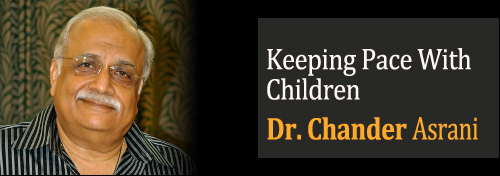Keeping Pace With Children
Oh! Bas kar maa! Dimaag kha gayi! Ab main kaise bataoon Tomato red kyoon hai?” Words of a grandmother said jokingly on never-ending queries of her 2-year-old granddaughter.
A comment by Vinitha sparked a thought; we know that parents spend hours to learn tips & tricks on bringing up kids in the right way but do we spare a thought on how a parent has to struggle (with a smile) to keep pace with GenNext kids galloping with learning newer things by the minute.
Blessed with a huge database of patients, I mailed a small questionnaire to those with kids below 5 years, and got some great answers that led me back to my text books and some Googling.
Most parents agreed that it takes a conscious effort to keep pace with their child’s never-ending curiosity (some termed it as ‘intellectual demands’) and they go out of their way – both in terms of time and research – to keep the answers flowing.
Why the struggle?” I asked few of the respondents “We don’t want to kill the curiosity”, was the reply.
I use some of the replies for writing this post:
- I have 4 years old twins, one keeps asking questions. “Yeh kya hai?” “Yeh kyon hai?” Other one is not so curious. We have been observing that the one who asks questions has better memory than the quiet one.
Excerpt from medical books: Curiosity is an innate basic emotion. Curiosity and Memory – the two neurological processes are linked. Curiosity is defined as the urge to seek out novel stimuli. For an individual to determine if a given stimulus is novel, he/she must remember if the stimulus has been encountered earlier. Thus, memory plays an integral role in identifying novelty and also the level of curiosity.
- S, mother of the child whose exasperated grandmother is mentioned above, narrated – ‘We applied for admission in an upmarket IB school, where the chances of getting admission were virtually nil. All the time we were waiting. Ahana (the girl, who was 3 year then) kept asking – “Mom, why so many children here? Whose birthday is it? Why is there a line (she meant queue)?” I kept giving some vague answers as I thought mention of interview might scare her. To my surprise, as soon as we entered, she walked up to the principal and asked, “Why are so many children waiting out and coming in one-by-one? What are you giving?” The principal laughed and granted admission without asking any questions. She said, “In my career, no child has walked in and asked me a question”! My mother-in-law and I would take turns in sitting/playing with her answering all her questions; many a times we are embarrassed with her boldness; she would walk up to strangers and talk; once she asked a balding man, “Uncle, aap ke baal kahan hai?” Pun apart, I am just an Arts graduate but while keeping pace with her questions (many a times using dictionaries to learn how to properly describe things), today I feel (and she considers me) as her mentor!’
My take – If we want our kids to grow up questioning any thing wrong that is happening; they have to begin questioning early and we have to be around to provide the right answers. We have to inspire them to be bold enough to question things. Boldness, in addition to fueling curiosity will also help them not be scared of failure. I am sure all would agree, when you are not able to answer some poser from a child, another tough one is fired!
- Father of a 4 yr old, Senior HR professional, gave a new dimension to all this questioning by children. “The look of satisfaction (& happiness) on his face when he gets an answer (that satisfies him) is a big boost to all our efforts of finding time to be around and keep answering all that he asks”. I had never thought/heard of a child feeling happy and satisfied with answers received.
Back to my books: There is a reward pathway in the brain; many neurotransmitters are released when reward pathway is activated. Viz dopamine, serotonin and opioid-derived chemicals. Recent studies have shown that dopamine is important in the process of curiosity.
In adults, drive to learn new information is often initiated by the anticipation of reward (which could be either material or an emotional sensation of relief and happiness). Kids don’t value material rewards while putting up their queries, hence, it can be deduced that their reward also is satisfaction and happiness.
Additionally, even for adults, reward values are always better retained; we remember our rewards (both material and non-material) longer. Thus it can be accepted that curiosity, reward and memory are interlinked.
- Most responses were of how well kids can operate phones, pads, laptops and how difficult it is for uninitiated grandparents to keep up the pace of answering.
Many also said, “I am sure our parents didn’t find it so difficult!”
…& my answer was “so what if we are not GenNext kids; our parents also did not have Googleji ”
Parents, your experiences are most welcome. Maybe I will get my next theme.
Dr Chander Asrani, father to three daughters and grand father to one, is a post-graduate in Family Medicine. He has over 35 years in clinical practice, launched www.growingwell.com in 2000 and since then has been writing on various subjects. Know more about him at about.me/drasrani.

